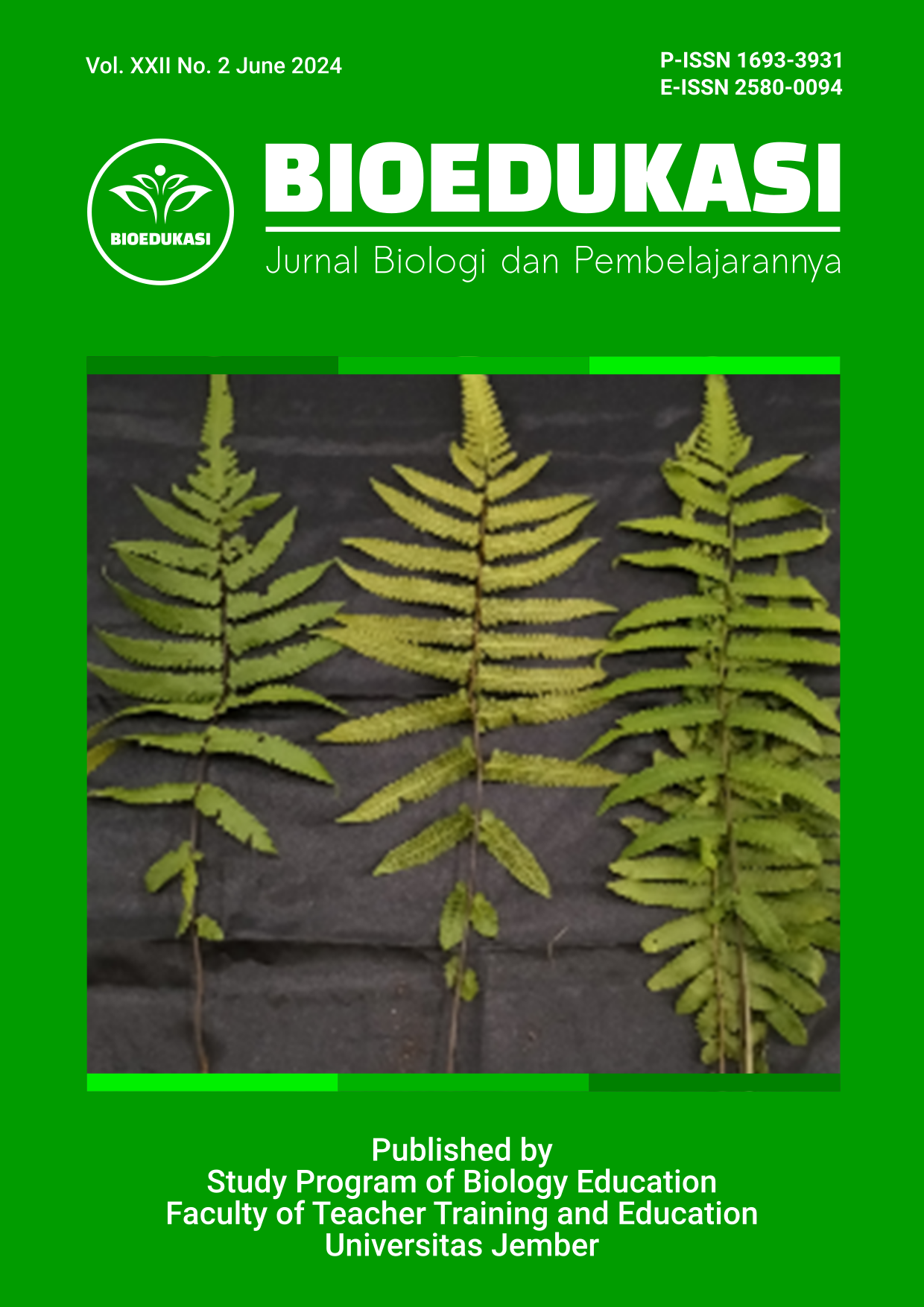The The Effectiveness of Problem Oriented Project Based Learning (POPBL) Towards Scientific Literacy in Public Senior High School 1 Cluring Banyuwangi
DOI:
https://doi.org/10.19184/bioedu.v22i2.44771Keywords:
Based Learning (POPBL), Effectiveness, Scientific literacy, Problem Oriented Project ModelAbstract
There are various project-based learning models that can encourage scientific literacy. This study aims to analyze the effectiveness of the POPBL model in increasing high school students scientific literacy. This quasi-experimental research used a nonequivalent control group design. The population of this study was students of eleventh graders of Science at Public Senior High School 1 Cluring, with two eleventh classes of Science 1 and Science 2 as samples. The data collection method is using scientific literacy test. The data analysis used an analysis of the covariance test. The results showed that POPBL was effective in increasing the scientific literacy of SMAN 1 Cluring students.
Downloads
References
Angraini, G. (2014). Analisis Kemampuan Literasi Sains Siswa SMA Kelas X Di Kota Solok. Prosiding Mathematics and Sciences Forum 2014. http://prosiding.upgris.ac.id/index.php/masif2014/masif2014/paper/view/427
Eliyawati, Sanjaya, Y., & Ramdani, A. S. (2020). IMPLEMENTATION OF PROJECT ORIENTED PROBLEM-BASED LEARNING (POPBL) MODEL INTEGRATED WITH STEM TO ENHANCE JUNIOR HIGH SCHOOL STUDENTS’ SCIENCE CONCEPT MASTERY. Jurnal Pena Sains, 7(2). https://doi.org/DOI: https://doi.org/ 10.21107/jps.v7i2.8260
Fives, H., Huebner, W., Birnbaum, A. S., & Nicolich, M. (2014). Developing a Measure of Scientific Literacy for Middle School Students. Science Education, 98(4), 549–580. https://doi.org/10.1002/sce.21115
Gormally, C., Brickman, P., & Lut, M. (2012). Developing a test of scientific literacy skills (TOSLS): Measuring undergraduates’ evaluation of scientific information and arguments. CBE Life Sciences Education, 11(4), 364–377. https://doi.org/10.1187/cbe.12-03-0026
Ibrahim, N., & Abd.Halim, S. (2013). Implementation of Project Oriented Problem Based Learning (POPBL) in Introduction to Programming Course. International Research Symposium on Problem Based Learning (IRSPBL) 2013. http://vbn.aau.dk/da/publications/pbl-across-cultures%285ce5393d-4200-46a8-bd65-fa47a304ea78%29.html
Ismail, I., Permanasari, A., & Setiawan, W. (2016). Efektivitas virtual lab berbasis STEM dalam meningkatkan literasi sains siswa dengan perbedaan gender. Jurnal Inovasi Pendidikan IPA, 2(2), 190. https://doi.org/10.21831/jipi.v2i2.8570
Latada, F., & Kassim, H. (2017). Problem-Oriented Project -Based Learning (POPBL): An Initiative To Encourage Soft Skills Expansion Among Students At A Public University. Journal of Global Business and Social Entrepreneurship (GBSE), 1(3), 75–83. http://umpir.ump.edu.my/id/eprint/17065/1/PROBLEM-ORIENTED PROJECT -BASED LEARNING.pdf
Leddy, D. paul, & Ormrod, ellis jeanne. (2018). Defining endoscopic remission in ileocolonic Crohn’s disease: Let’s start from scratch. In Journal of Crohn’s and Colitis (Vol. 12, Issue 10). https://doi.org/10.1093/ecco-jcc/jjy097
Leite, A. F. M., & Bonamino, A. M. C. de. (2021). Scientific Literacy: A Comparative Study Between Brazil And Japan.
Lendeon, G. R., & Poluakan, C. (2020). Pengaruh Model Problem Based Learning (PBL) Terhadap Kemampuan Literasi Sains Siswa. Science Learning Journal, 3, 14–21.
Nurdyansayah, & Fahyuni, E. F. (2016). INOVASI MODEL PEMBELAJARAN. Nizamial Learning Center Sidoarjo.
OECD. (2015). OECD Programme for International Student Assessment 2015 PISA 2015 RELEASED FIELD TRIAL.
OECD. (2019). PISA 2018 Results (Volume II): Where All Students Can Succeed, PISA, OECD: Vol. II.
OECD. (2022). PISA 2022 Results The State of Learning and Equity in Education: Vol. I. https://www.oecd.org/publications/pisa-2022-results-volume-i-53f23881-en.htm
Permanasari, A., & Fitriani, A. (2016). Jurnal Pendidikan IPA Indonesia ELEMENTARY SCHOOL ’ S STUDENTS SCIENTIFIC LITERACY. 5(2), 261–267. https://doi.org/10.15294/jpii.v5i2.5493
Pratiwi, S. N., Cari, C., & Aminah, N. S. (2019). Pembelajaran IPA Abad 21 dengan Literasi Sains Siswa. 9, 34–42.
Romli, S., Suhandi, A., & Kaniawati, I. (2024). Research trends in the development of learning models oriented to increasing scientific literacy : A systematic literature review. 07(March 2023), 66–79. https://doi.org/10.24042/ijsme.v5i1.20517
Rongbutsri, N. (2017). Aalborg Universitet Students Using Online Collaborative Tools in Problem-Oriented Project-Based Learning Rongbutsri , Nikorn Publication date : Aalborg Universite. https://doi.org/https://doi.org/10.5278/vbn.phd.hum.00072 General
Saputra, H. (2020). Pembelajaran Berbasis Masalah (Problem Based Learning). Jurnal Pendidikan Inovatif, 5(1), 1–7. https://doi.org/10.17605/OSF.IO/GD8EA
Saraswati, D. A., Sandrian, D. N., Nazulfah, I., Abida, N. T., Indriyani, R., & Lestari, I. D. (2022). Analisis Kegiatan P5 di SMA Negeri 4 Kota Tangerang sebagai Penerapan Pembelajaran Terdiferensiasi pada Kurikulum Merdeka. Jurnal Pendidikan MIPA, 12(ISSN: 2088-0294 | e-ISSN: 2621-9166 https://doi.org/10.37630/jpm.v12i2.578), 185–191. https://doi.org/https://doi.org/10.37630/jpm.v12i2.578 Analisis
Setiarini, S. D., & Wulan, S. R. (2021). Analysis Software Engineering Team’s Soft Skills Learning using Online Learning Platform with Project-Oriented Problem-Based Learning (POPBL). Inform : Jurnal Ilmiah Bidang Teknologi Informasi Dan Komunikasi, 6(2), 81–86. https://doi.org/10.25139/inform.v6i2.3986
Stapleton, L., & Stefaniak, J. (2019). Cognitive Constructivism : Revisiting Jerome Bruner ’ s Influence on Instructional Design Practices. 4–5. https://doi.org/10.1007/s11528-018-0356-8%0A
Wan Husin, W. N. F., Mohamad Arsad, N., Othman, O., Halim, L., Rasul, M. S., Osman, K., & Iksan, Z. (2016). Fostering students’ 21st century skills through project oriented problem based learning (Popbl) in integrated stem education program. Asia-Pacific Forum on Science Learning and Teaching, 17(1).
Wicaksono, R. S., Susilo, H., & Sueb. (2019). Implementation of Problem Based Learning Combined with Think Pair Share in Enhancing Students’ Scientific Literacy and Communication Skill through Teaching Biology in English Course Peerteaching. Journal of Physics: Conference Series, 1227(1). https://doi.org/10.1088/1742-6596/1227/1/012005
Wulandari, N., & Sholihin, H. (2016). Analisis Kemampuan Literasi Sains Pada Aspek Pengetahuan Dan Kompetensi Sains Siswa Smp Pada Materi Kalor. EDUSAINS, 15(1), 165–175. website: http://journal.uinjkt.ac.id/index.php/edusains
Yasin, R. M., & Rahman, S. (2011). Problem Oriented Project Based Learning ( POPBL ) in Promoting Education for Sustainable Development. Procedia - Social and Behavioral Sciences, 15, 289–293. https://doi.org/10.1016/j.sbspro.2011.03.088




 https://orcid.org/0000-0003-1920-0515
https://orcid.org/0000-0003-1920-0515